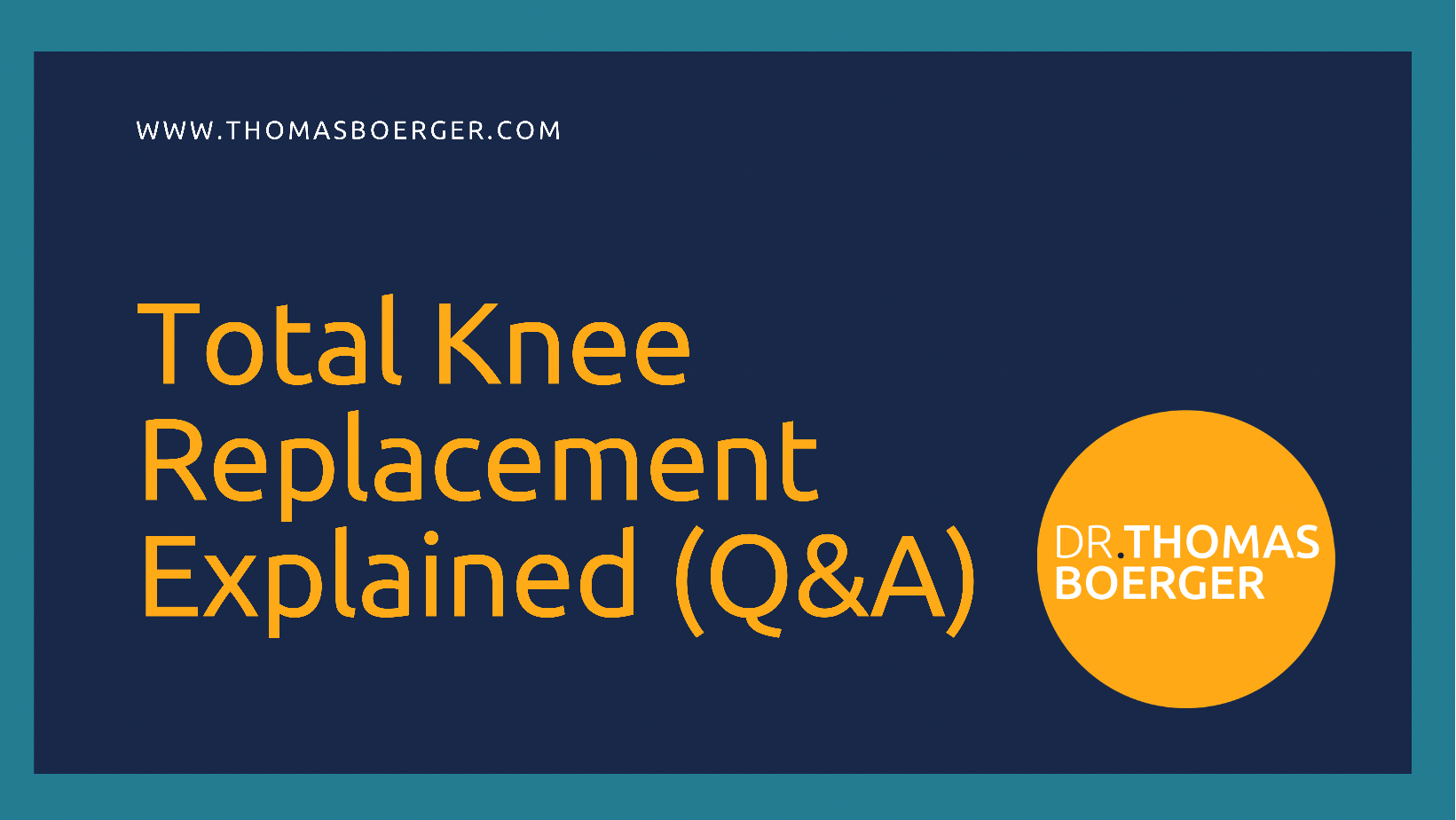
A total knee replacement can transform the quality of life for those who have suffered a significant injury, or pain and stiffness from osteoarthritis. Here I answers the most common questions about Total Knee Surgery.
What is a Total Knee Replacement?
The aim of a Total Knee Replacement is to offer pain relief and knee mobility with normal leg alignment.
Total Knee Replacement may become necessary in patients with advanced arthritis affecting more than one compartment of the knee when other pain relieving measures are no longer effective. Similarly, patients with loss of full straightening and/or bow-or-knock-knee deformity can expect to have their knees straightened with a Total Knee Replacement. How far the knee eventually bends in everyday life depends on a multitude of factors including the patient’s efforts at rehabilitation.
Assessment
Dr. Boerger assesses all potential knee replacement patients carefully. This includes a functional review including gait assessment, lower limb joint examination and extended radiological investigation. Typical x-ray images taken include both knees standing frontal view, true lateral view with calibration marker and axial patella view.
Preparation
All joint replacement patients undergo a pre-operative review with Dr. Boerger’s Nurse Assistant, Tanya Keble, and a review with a HC International Hospital anaesthetist. Basic investigations include screening blood tests and ECG. To minimize the risk of a peri-operative joint infection multiple skin and nose swabs are taken for MRSA and MSSA. Patients testing positive for skin colonisation are treated with body washes and ointment at home until repeated test results are negative.
If deemed necessary, a medical review will be scheduled. If cardiac problems are known or anticipated, a full cardiac work-up including stress test and heart catheterisation can be performed at HC International Hospital.
How Long Will I Stay in Hospital?
A Total Knee Replacement typically requires a hospital stay of 3 to 5 nights, as the procedure is more comprehensive than a Partial Knee Replacement.
The time in hospital is used for pain relief and physiotherapy. Some patients are able to be discharged earlier. Some patients request further in-house rehabilitation for another week or two. This can be arranged at HC International Hospital. Procedures are in a private hospital with very comfortable private rooms.
From your initial consultation, a comprehensive, personalised treatment plan is created. In preparation for your recovery, there is a specific pain-relief plan established for you to minimise post-operative discomfort.
How Long Does Recovery & Rehabilitation Take?
A Total Knee Replacement requires comprehensive rehabilitation as part of your patient treatment plan. In addition to our expert physiotherapy offered during your short hospital stay, some patients request further in-house rehabilitation for another week or two. This can be arranged at our HC International Hospital. In addition, as an out-patient, we are also happy to liaise with your preferred rehabilitation professional to design a recovery plan.
What Results and Aftercare can I expect?
Although risks of complications are higher than for a Partial Knee Replacement, patient satisfaction for a Total Knee Replacement is very high. You can once again expect to be able to walk with a stable, pain-free knee.
Expected implant survival times are often more than 15 years. Dr. Boerger uses implants with validated long survival times and operative techniques that minimise risks and complications, including surgery performed in a laminar flow theatre and the use of astronaut-style helmets with all joint replacement surgery.
Before surgery, patients will meet a physiotherapist at HC International Hospital, and will be taught how to use crutches, transfer in and out of bed safely and perform basic daily tasks.
Smokers must stop for 6 weeks before and after surgery in order to minimise the risks of post-operative complications such as cardio-respiratory problems, delayed wound healing, infection, and blood clot formation.
Most patients are maintained on anti-coagulation for 4 weeks after surgery.
Dr. Thomas Boerger personally follows up all his patients at 2 weeks, 6 weeks, 6 months and 1 year with new x-rays.
How Can I Book a Private Consultation?
Dr. Thomas Boerger consults in Gibraltar at Specialist Medical Clinic, as well as at the College Clinic. In Marbella the private consultations are Held at HC Marbella. Full details on the CONTACT page.